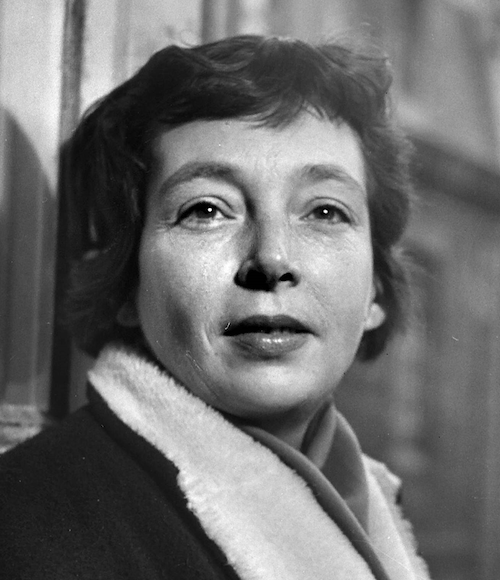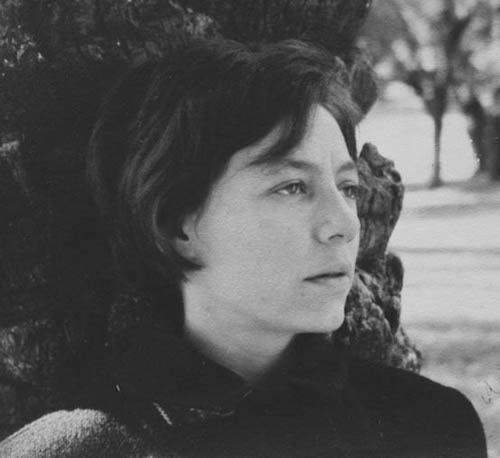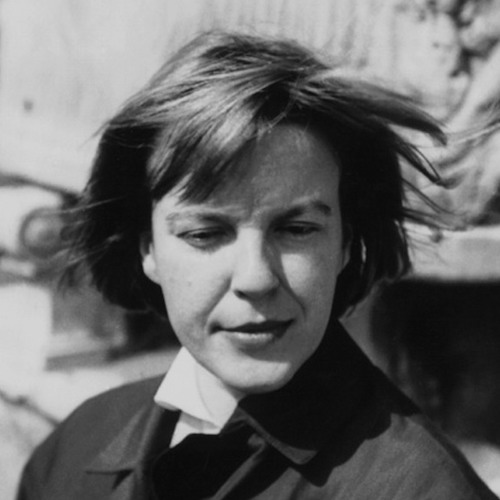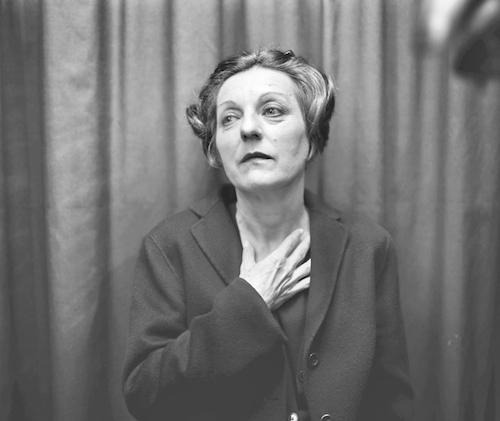The Vanishing Act: On Duras, Pizarnik, Bachmann, and Müller
BY Cynthia Cruz

I have been thinking of ways in which writers have vanished—the way they have vanished themselves from the literary world and from the world itself. I have been thinking, specifically, of how writers who have experienced marginalization have left either because they could not manage to make their voice, their language, cohere to the major language or because, though perhaps they could conform and assimilate, they chose not to.
I am also thinking of writers who have been vanished by being excluded, as voices who do not fit nicely into the current trends. It’s not possible to think about these things without recognizing the power structures at work and the work of gatekeepers. Writers whose experiences lie outside the white, middle class experience (the experience of most of the gatekeepers) cannot transform and become something they are not in order to be seen and heard.
In graduate school the feedback I received from students and teachers was that I was incomprehensible. Later, I was called “feral.” The way I understood this was that my working class and bi-racial background were “too wild,” which made my writing too wild, and that in order to be “got,” I needed to be tamed. It was a different kind of assimilation than the one my father, the child of Mexican immigrants, went through—but in many ways, it was the same. In order to be seen or heard, we were told we needed to let go of who we were in our essence. If we wanted to be acknowledged, we needed to become something we never were.
What this “taming” meant to me was being erased. My father taught me that in order to succeed in this country, I needed to work one hundred times harder than everyone else. It was hard work that would move me forward. My training in poetry taught me that in order to be a great poet, I needed to work extremely hard, and for me working extremely hard meant revising and revising until I had constructed the “perfect” line, the “perfect” stanza, the “perfect” poem. In other words, becoming a great poet meant refinement, which meant editing out the wild, the “wild” meaning who I truly am.
My interest in female poets who refuse to be silenced or, conversely, take their silence and use it, refusing articulation, is profoundly important to me. Instructive, in fact. I have found a tribe of women I can learn from—
***

MARGUERITE DURAS
Duras, French but born in Vietnam, grew up with her mother and brother in poverty and in exile. Her father died soon after the family arrived in Vietnam. Like other exiled writers, like other writers with a similar experience of being neither one nor another identity, Duras changed her name (from Donnadieu to Duras) and created a new identity, one that might speak to this third identity (neither French nor Vietnamese). And in doing so, she (Donnadieu, her given name, her origin, her identity) vanishes into her pseudonym, Duras. In essence, she vanishes, consumed by the Duras that Duras created, and is gone.
Y.A.: Do you have a title for the next book?
Marguerite Duras: Yes. The Vanishing Act.
—No More, C’est Tout
“Writing also means not speaking. Keeping silent,” Marguerite Duras writes in Writing. That silence is a force and not a passive response, becomes clear when reading her works. Duras is referring to the possibility of a language constructed of silence; a mirroring of the hesitation inherent in not-knowing. Rather than attempt to mimic the language of those in power, Duras creates a language that can enact the brokenness of her experience. Furthermore, when she writes “not speaking. Keeping silent” we are to understand this silence as a form of language itself and not as its negation. Duras’s writing, over the years, becomes more and more flooded in this silence so that by the time she writes her final book, No More, it is as if her words are floating on the page or, rather, drowning in the blank of the page. And where is Duras? As her texts become saturated more and more with the space of the page, with silence, one can see Duras becoming more and more silenced. It is as if the words on the page are her actual spoken words. In this case, she, too, is drowning in silence—it isn't just that her written words becomes less and less but, at the same time, her voice recedes as she recedes, as she vanishes into her self.
No More is only half the title of the book. The entire title is No More: C’est Tout which translates to “No More” That’s it” or “No More: That’s all.”
Silence, and then.
Do you hear this silence.
I hear the sentences you speak
instead of the woman who is writing.
The word silence occurs frequently throughout the book. A reprieve, often it appears before the “entries” so that there is a kind of doubling of silence both on the pages, which are often entirely blank aside from three small islands of two or three short lined vignettes, and then, again, with the word “silence.” A double silence.
For example:
Silence.
I’ll love you enough not to
abandon you.Silence.
You are null and void. Nothing.
A double zero.Sunday July 23.
I cannot bring myself to be nothing.
The silence on the page in the form of blank space as well as the word silence are one aspect of vanishing, but another is, of course, the subject matter: of Duras’s vanishing. Here, in her final book, published just one year before her death, she is writing about her eventual banishment from the world (she dies of cancer in 1996) but it is my belief that Duras was always writing about her demise. In fact, her writing was a kind of chipping away at herself, a means of becoming less. As she writes, she is lost into the words which are lost inside the writing. To see the small islands of text on the page is to see the disappearing of Duras.

ALEJANDRA PIZARNIK
I inherited from my ancestors the desire to flee. They say my blood is European. I feel that every drop originates from a distinct point. From this nation, that province, this island, that gulf, accident, archipelago, oasis. From every piece of land or sea they stole something and so formed me, condemning me to the eternal search for a place of origin.
—Diary entry, July 5, 1955
Alejandra Pizarnik, born in 1936, was a second generation immigrant of Jewish descent. Her parents fled anti-Semitism, emigrating to Argentina from the Ukraine just two years before her birth in 1936. Pizarnik was brought up in a Yiddish-speaking household and attended a Jewish school. Again and again the word silence appears in her work. Like Duras, Pizarnik evokes silence vis a vis space on the page. Also, as Emily Cooke writes, Pizarnik spent much of her time removing and then adding her words back into her poems:
By all accounts, hers included, the Argentine poet Alejandra Pizarnik (1936-1972) spent as much time subtracting words from her poems as adding them. She was perennially mistrustful of her medium, seeming sometimes more interested in silence than in language, …
It is as if this seemingly compulsive behavior is an enactment of her both being Argentinian (born and raised in Argentina) and not being Argentinian (Jewish, of Eastern European descent). The adding and subtracting occurring in the poems can be seen as an act of repetition compulsion: an acting out of Pizarnik’s experience. By repeating the word “silence” in her writing, in her diaries, letters and poems, the word takes on a life of its own: as if silence, itself, is a character. And, in fact, one could say that silence is a character. It is, in fact, Pizarnik.
In her poem “The Word That Heals” from A Musical Hell (translated by Yvette Siegert), Pizarnik writes: “While waiting for a world to be unearthed by language, some / one is singing about the place where silence is formed.” Here, she is suggesting that there is a “place where silence is formed” as if that place were not here—but elsewhere. But where is this elsewhere? Perhaps that elsewhere is with another voice. Pizarnik writes of her “other voice” and how it is with this other voice, that she is able to speak. In her poem “Cornerstone,” she writes: “I cannot speak with my voice, so I speak with my voices” and “—that great otherness of / my self, that lies in wait for me to be silenced before it can take pos / session of me.” It is as if by silencing her self (her “other self,” her “other me”), Pizarnik gains mastery over the cultural silencing that is occurring to her.
In addition, Pizarnik wrote many times of drowning beneath language. For example, in her poem “Of Things Unseen” also from A Musical Hell, she writes: “The light of language covers me like music, like a picture ripped / to shreds by the dogs of grief.” Again, in her poem “Cold in Hand Blues” Pizarnik writes: “I’m going to hide behind language / why / I’m afraid.” In addition to making silence on the page and invoking it in the poems, Pizarnik also doubles by adding and removing words, writing with two selves and, finally, by hiding or being covered by language which suggests that one voice is being submerged while another is doing the speaking. There is much more that can be written about the theme of doubling and Alejandra Pizarnik with regard to sexuality, gender, and her background, but suffice to say like Duras, Pizarnik recognized the two Alejandras inside her and knew only one could survive. Suicide (the ultimate removing of words from the page) was a recurring obsession. After a suicide attempt in 1970, Pizarnik was institutionalized and eventually ended her life at the age of 36 by overdose.

INGEBORG BACHMANN
“There was a specific instance that destroyed my childhood,” Ingeborg Bachmann, the Austrian writer, once said. “The arrival of Hitler’s troops in Klagenfurt. It was horrifying that my memory begins with this day...the terrible brutality that one could feel, the shouting, singing and marching—the origin of my first death fear.” And it was this first memory that informed her writing and her living. As Peter Filkins, Bachmann’s translator, writes in his introduction to her collection of poems, Darkness Spoken, “Deeply devastated by the hysteria and horror manifested by the war, she never felt that the violence and atrocities ceased with Germany’s surrender.” Language, she believed, was where fascism resided. And it was through language that one might make a new world as she wrote: “No new world without a new language.”
Bachmann left Austria in 1953 and immediately took up residence in Rome, though she spent much of her life wandering from city to city and from country to country: to Naples, the island Ischia, Munich, Zürich, Frankfurt, Berlin, Sudan, Prague, Egypt. If after the war Austria cannot be her home, then she will have none. This movement from place to place is a bit like Pizarnik’s careful adding and subtracting of words: she wanders and travels, moving forward, but she never truly settles. It is a kind of adding and erasing of a home and of a self. And to stay in one place, to anchor one’s self and identity to a home, is to become part of that place. Bachmann never truly anchored herself anywhere.
Akin to her wandering, her writing also fragments. On the page, for example, the text of The Book of Franza & Requiem for Fanny Goldmann becomes more broken and fractured as the book progresses. Of course, this is due to the fracturing of the main character, Franza, who flees from Austria to Egypt to escape her cruel husband who has placed her in a sanitarium. After many years of silence, she sends her brother, Martin, a telegram. The two meet in their childhood home and then travel together to Egypt where Franza hopes to be cleansed of her past. But in the desert of Egypt she has a breakdown and, in a sense, vanishes. Bachmann is not, of course, Franza and yet—the similarities exist. Bachmann did flee Austria and she did travel to Egypt. In a sense, then, Bachmann vanishes into the character of Franza and then Franza vanishes.
The night before her death, Franza attempts to speak but her speech is fractured. She stutters and can’t say the thing she wants:
She moved her mouth again as if she wanted to say something to him, at least to say to him what she had never yet been able to say. She didn't want to hold back anything secret, any enigmas, but now something remained secret.
The book itself is a fragment (as is Requiem for Fanny Goldman, the second part of the book). Bachmann was at work on a series of novels titled “Todesarten” or “Death Styles” of which only the novel Malina was completed before her own death by fire in Rome in 1973. The series was meant to show the various ways society can drive women to their death. Bachmann’s own death has both been seen as a terrible accident (the fire was set by her own cigarette and she died from the result of her burns which covered 2/3 of her body) and, also, as a suicide. In a sense, the very thing Bachmann was writing about killed her before she was able to say the thing she wanted.

HERTA MÜLLER
I don’t trust language
—“Always the Same Snow,” from Christina and Her Double
Herta Müller, born in Romania in 1953, was able to emigrate to Berlin in 1987 after losing her position as a teacher and receiving death threats when she refused to become an informant for the secret police during Ceausescu’s totalitarian regime. A short story writer and novelist, Müller was first a poet as a child and has written collage poems as an adult. Like Bachmann, Müller is deeply suspicious of language, having experienced how language can be manipulated by those in power. Language is something to be wary of; something one must always eye with vigilance. And, as she writes in “In Every Language There Are Other Eyes,” it brings no relief:
Reading books or even writing about them brings no relief. If I have to explain why I find one book more rigorous and another shallow, I can only point to the frequency of passages that bring forth a disconnection in the head, passages that draw my thoughts straight to places where no other words can survive. The more frequently these passages occur in the text, the more rigorous the book; the sparser they are, the shallower the text. For me the criterion of a text’s quality has always been: does it bring about a silent disconnection in the head. Every good sentence flows to a place in the head where what it triggers speaks in something other than words.
Müller is an exile, of course. But she was in exile even before she fled Romania. Double exile? But there is yet another level of exile: wary of words, of language, she lives outside of them. Where? Inside, I think, the world of objects which cannot lie. A red plastic ball is only a red plastic ball. If I set the red plastic ball before you and you see it, we might disagree on its worth or where it originated but most likely we will agree on what it is. In her speech for the Noble Prize for Literature in 2009, Müller stated:
Can we say that it is precisely the smallest objects—be they trumpets, accordions or handkerchiefs—which connect the most disparate things in life? That the objects are in orbit and that their deviations reveal a pattern of repetition—a vicious circle, or what we call in German a devil’s circle. We can believe this, but not say it. Still, what can’t be said can be written. Because writing is a silent act, a labor from the head to the hand. The mouth is skipped over. I talked a great deal during the dictatorship, mostly because I decided not to blow the trumpet. Usually my talking led to excruciating consequences. But the writing began in silence, where I had to come to terms with more than could be said. What was happening could no longer be expressed in speech.
If language can’t be trusted, what can one do? Be extremely critical with regard to words—what words one uses—and not take language for granted. Words can kill—and they do. But another way is to make a new language. Or, perhaps, find a new language. Müller talks at length about flowers and language both in an interview for The Paris Review and in her essays: “When I made up my own names, it was another attempt to get closer to the plants, because they knew how to live and I didn’t. But it was a gap I couldn’t overcome.” Nature, as it turns out, is one thing that can be trusted.
Müller writes in her essay “In Every Language There Are Other Eyes”:
In the language of the village—so it seemed to me as a child—the words of all those around me lay directly on the things they were denoted. Things were called just as they were, and they were just as they were called.
Language, then, bleeds into the thing, itself. In fact, in a way language exists only in the thing itself, in the object. Words float off into nothing. And Müller’s writing is rich in things—and these things do the work: they carry the writing. And where does this leave the writer? For Müller, she exists someplace between silence (her own silence) and the object.
When Müller describes her desire to get closer to the plants, it is as if it is in the plants that she wants to vanish:
I’d look at my hands and feet and wonder what I really was. What material was I made of? Obviously something different than the cows or the plants. And being so different was hard for me. I’d look at the plants and animals and think to myself, they have a good life, they know how to live. So I tired to get closer. I talked to the plants. I would taste them and I knew what each one tasted like. I ate every weed I could find, thinking that once I’d tasted the plant I would be a little closer to it and that I could change into something else, that I could change my flesh, my skin into something that was more like the plant so that it would accept me.
In the end, then, language is not enough. It cannot communicate authentically when it has been corrupted by government propaganda, by corporations and the ever-vast media. If language can’t be trusted and if it can no longer serve as an alternative world in which to escape into, then where else can one hide?
Cynthia Cruz is a poet, novelist, and nonfiction writer. She is the author of the poetry collections...
Read Full Biography

